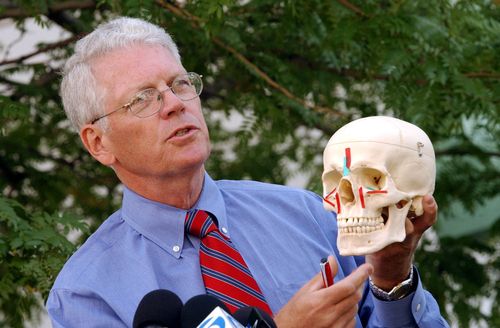This is an archived article that was published on sltrib.com in 2012, and information in the article may be outdated. It is provided only for personal research purposes and may not be reprinted.
Utah researchers have said goodbye with teddy bears and thank-you notes to the hundreds of Salt Lake County women and children they were following as part of the National Children's Study.
The University of Utah's federal contract to follow those families and their health as part of a massive effort to track 100,000 children from birth through age 21 ends Thursday — just seven years into what was expected to be a decades-long relationship.
At the same time, the U. is seeking a new federal contract to return to these families' homes and lives to be part of the search for the environmental and genetic causes of diabetes, obesity, autism, asthma and prematurity.
"We have completed much of our transition work, and we have a new chapter unfolding for us right now," said Edward Clark, Utah's principal investigator for the study and the state's top pediatrician, as chairman of the University of Utah's pediatric department and chief medical officer of Primary Children's Medical Center.
"While it's a poignant time ... this is a punctured equilibrium."
The U.'s pediatrics department has received about $20 million since 2005 when Salt Lake County was chosen as one of the seven pilot sites by the National Institute of Child Health and Human Development. Since 2009, 400 county families have enrolled, helping clarify the best recruitment strategies and ways to collect the mountains of data involved in the study.
Families have invited researchers into their homes to collect air, dust, blood and urine samples. Mothers have been questioned about their nutrition, exposure to chemicals and stress. They've even invited researchers to their births to collect blood samples from the placenta and umbilical cord and the babies' first stool.
The U. and the other pilot sites will no longer collect data due to federal budget cuts.
As first reported by the journal Nature, the White House has proposed to cut the study budget by 15 percent, or $28 million next year, down to $165 million.
Recruitment has fallen far short of expectations and is now on hold in the pilot sites. The study's main launch has also been delayed to 2014.
But the families already enrolled will still be followed. A North Carolina company, Research Triangle Institute, will take over data collection starting July 1.
As Utah researchers explained the shift to participants through letters and face-to-face visits, they urged the families to continue to participate even if the U. won't be there.
"Nobody's dropped out to date," Clark said. "These are families that have wrapped their arms around the problem, the risk of our children's future and have just said, 'We're in.'"
From a high of 100 employees working on the study in Utah, six now remain, Clark said. They have about six months and $3.5 million of work left to do wrap up the Salt Lake County portion of the study.
The U. also has a contract to collect data in a separate pilot study based in Cache County, where 800 families have enrolled. That contract is set to expire in 2013.
Clark said the U. is seeking a new children's study contract that would keep it involved in data collection and analysis.
As part of the transition, the U. hand-delivered its data — millions of data fields, including names — to the federal contractor Social & Scientific Systems, Inc., in Washington, D.C. The federal government also has copies of the information, but without personal identifiers, Clark said.
The U. kept a copy of the information to do its own research related to pregnancy and delivery.
"We want to know what's going on in Utah," Clark said.



